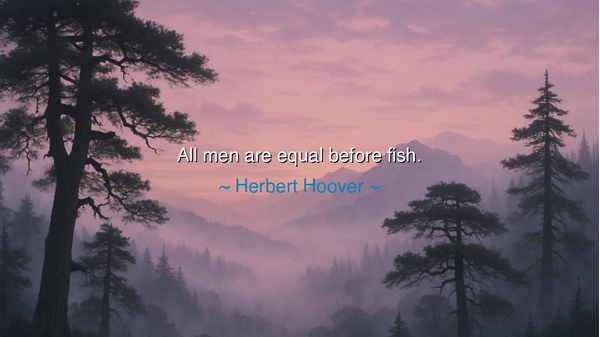
All men are equal before fish.






"All men are equal before fish." These words, spoken by Herbert Hoover, carry a striking and almost paradoxical message that transcends the usual political rhetoric of the time. Hoover, a man known for his work as a statesman and later as the 31st President of the United States, offers a humorous yet profound reflection on the human condition. What Hoover’s words suggest is that, in the eyes of nature, all human distinctions—whether of wealth, rank, or social standing—are insignificant when placed in the context of the fundamental forces that govern the natural world. Fish, in this metaphor, become a great equalizer, reminding us that, regardless of our personal achievements, we are ultimately subject to the same laws of nature as all creatures.
In the ancient world, the philosophers of Greece and Rome often reflected on the relationship between man and nature. Heraclitus, the great thinker, believed in the constant flux of existence, where all things, from the smallest particles to the vast expanse of the cosmos, are in a perpetual state of transformation. He saw humans as part of this larger system, not above it. Similarly, Marcus Aurelius, the stoic philosopher and Roman emperor, often wrote in his meditations that all men are part of the great cosmic order. He reminded his readers that, though men strive for power and prestige, they are ultimately part of a grander design—a design that treats all beings, great or small, with equal importance in the eyes of the natural world.
This concept of equality before nature is not unique to ancient philosophy but is a recurring theme throughout human history. Take, for example, the famous story of Saint Francis of Assisi, who, though born into wealth, came to view all creatures of nature—birds, wolves, and even fish—as equals. He saw them as brothers and sisters, creatures who, like humans, were part of the divine creation. His humility and reverence for nature underscored the ancient wisdom that, in the eyes of the earth, we are all the same. Even a king or priest must humble themselves before the forces of nature, just as they must reverence the fish that swim in the sea or the trees that grow in the forest.
In the modern context, Hoover’s words may seem humorous, but they hold a timeless truth. Fish, like all creatures of nature, are not concerned with the status or wealth of those who fish for them. Nature does not distinguish between the rich and the poor, the powerful and the powerless. Just as in the past, no amount of human power can protect us from the basic needs of survival or the inexorable forces of nature. Just as the fish swim freely in the rivers, unaffected by the distinctions that humans create, so too must we understand that the most basic aspects of life are not influenced by the arbitrary divisions of wealth or status.
Consider the story of the great flood in the Bible, where Noah, a humble man, was instructed to save himself, his family, and the creatures of the world by building an ark. The waters, in their ferocity, did not discriminate between the kings and the peasants—all were subject to the same overwhelming force of nature. In this narrative, the animals, as well as Noah’s family, find refuge in the ark, a symbol of the equality before the raw power of nature. The flood waters, in their devastation, remind us that no matter our human achievements, we are still at the mercy of the elements, bound by the same natural laws that govern every living being, from the tiniest insect to the mightiest king.
Hoover’s words are a gentle reminder that, in the end, all men are equal in the face of nature. We may create societies, economies, and institutions that define our worth in worldly terms, but those are temporary constructs. The true, eternal forces of nature—like the fish that swim in the rivers and oceans—are far more enduring and indifferent to our human distinctions. The lesson from Hoover’s words, therefore, is one of humility and reverence for the world around us. In our pursuit of success, we must remember that the natural world will continue to shape our fate, regardless of our status.
The practical lesson here is clear: we must live with a deep respect for nature and its creatures, recognizing that we are not above them but part of the same great web of existence. Whether it is the fish in the sea or the trees in the forest, every part of nature plays its role in maintaining the delicate balance of life. Let us seek to live in harmony with the world around us, humbling ourselves before the forces that govern the earth, and recognizing that our humanity is but a small part of a much greater whole. Equality before nature should be our guiding principle, teaching us not only humility but also the importance of protecting and preserving the world that sustains us all.






AAdministratorAdministrator
Welcome, honored guests. Please leave a comment, we will respond soon